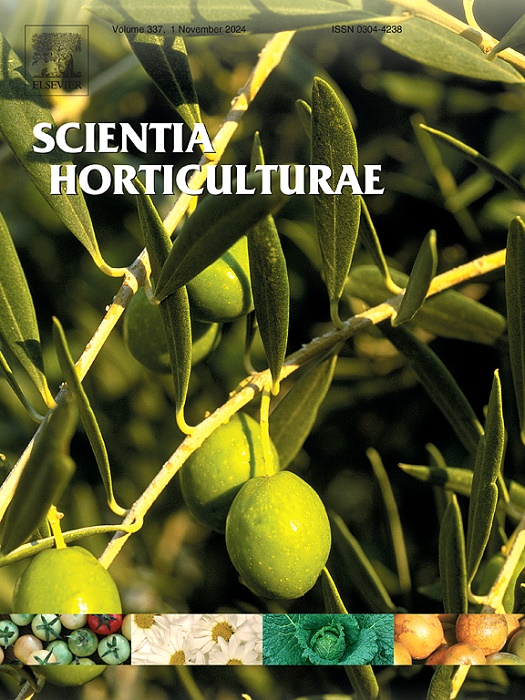Selecting superior genotypes to enhance yield and fruit quality in Australian passion fruit
IF 4.2
2区 农林科学
Q1 HORTICULTURE
引用次数: 0
Abstract
Passion fruit (Passiflora edulis) holds significant economic value due to its distinct flavour, aroma, rich nutritional composition, and notable medicinal benefits. Despite its economic importance, the passion fruit industry is constrained by the limited availability of improved cultivars, which adversely affects yield, fruit quality, and profitability. Breeding efforts aimed at improving passion fruit are complex due to the polygenic nature of yield and quality traits, as well as the genetic correlations among them. This study evaluated nine agronomic traits (fruit weight and number, pulp weight and content, fruit length and diameter, soluble solids, skin thickness and yield) across 10 genotypes to estimate heritability and genetic correlations and to identify promising candidates for yield and quality improvement. Heritability estimates ranged from 0.58 for fruit number to 0.95 for pulp weight. Strong and positive genetic correlations were observed among traits related to fruit size and weight, ranging from 0.94 (fruit length–fruit diameter) to 0.97 (fruit weight–fruit diameter). Based on the predicted genetic values of nine fruit traits, different genotype rankings were obtained. The top 20 % of genotypes (PF102 and PF115) were identified using a selection index for fruit yield and soluble solids, achieving gains of 59.11 % and 6.68 %, respectively. Additionally, the study assessed weight loss and storage quality, revealing that PF101 had the longest shelf life, lasting 40 days. These findings provide valuable insights for selecting genotypes in passion fruit breeding programs aimed at improving yield, quality, and post-harvest performance.
选择优良基因型提高西番莲产量和果实品质
百香果(Passiflora edulis)因其独特的风味、香气、丰富的营养成分和显著的药用价值而具有重要的经济价值。尽管百香果具有重要的经济意义,但其产业受到改良品种有限的限制,这对产量、果实质量和盈利能力产生了不利影响。由于百香果产量和品质性状的多基因性质以及它们之间的遗传相关性,旨在改善百香果的育种工作是复杂的。本研究评估了10个基因型的9个农艺性状(果实重量和数量、果肉重量和含量、果实长度和直径、可溶性固形物、果皮厚度和产量),以估计遗传力和遗传相关性,并确定了产量和品质改良的有希望的候选品种。遗传率估计从果实数0.58到果肉重量0.95不等。果实大小与果实质量相关性状的遗传相关性为0.94 ~ 0.97(果长果径)。根据9个果实性状的预测遗传值,得出不同的基因型排序。利用果实产量和可溶性固形物选择指数对前20%的基因型(PF102和PF115)进行鉴定,分别获得59.11%和6.68%的增益。此外,该研究还评估了减重和储存质量,结果显示PF101的保质期最长,长达40天。这些发现为在百香果育种计划中选择基因型提供了有价值的见解,旨在提高产量、质量和收获后性能。
本文章由计算机程序翻译,如有差异,请以英文原文为准。
求助全文
约1分钟内获得全文
求助全文
来源期刊

Scientia Horticulturae
农林科学-园艺
CiteScore
8.60
自引率
4.70%
发文量
796
审稿时长
47 days
期刊介绍:
Scientia Horticulturae is an international journal publishing research related to horticultural crops. Articles in the journal deal with open or protected production of vegetables, fruits, edible fungi and ornamentals under temperate, subtropical and tropical conditions. Papers in related areas (biochemistry, micropropagation, soil science, plant breeding, plant physiology, phytopathology, etc.) are considered, if they contain information of direct significance to horticulture. Papers on the technical aspects of horticulture (engineering, crop processing, storage, transport etc.) are accepted for publication only if they relate directly to the living product. In the case of plantation crops, those yielding a product that may be used fresh (e.g. tropical vegetables, citrus, bananas, and other fruits) will be considered, while those papers describing the processing of the product (e.g. rubber, tobacco, and quinine) will not. The scope of the journal includes all horticultural crops but does not include speciality crops such as, medicinal crops or forestry crops, such as bamboo. Basic molecular studies without any direct application in horticulture will not be considered for this journal.
 求助内容:
求助内容: 应助结果提醒方式:
应助结果提醒方式:


